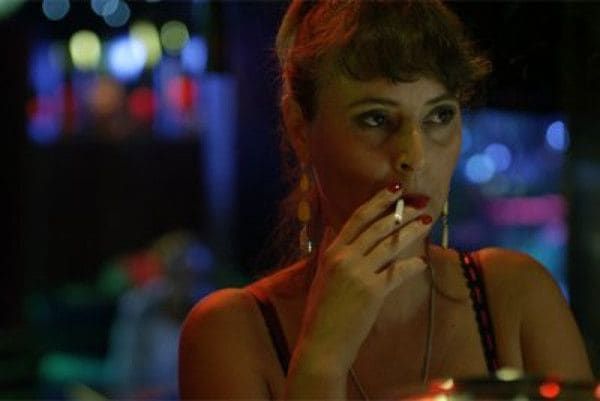Eye For Film >> Movies >> We Are Never Alone (2016) Film Review
We Are Never Alone
Reviewed by: Amber Wilkinson

Petr Václav's latest film is almost smothering in its bleakness - to the point where you feel the need to come up for air after a mere 20 minutes, let alone the full 105. Set in a small town in the Czech Republic, it wears its metaphors like a shroud. Although the town lies close to the sort of lush, green woodland that ought to make you think picture postcard, each break in the hedgerow seems to be occupied by a prostitute or two, presumably working off-hours from the local brothel.
Also nearby, lies a prison, where a guard (Miroslav Hanus) works before taking his paranoia back to his house, which is more like a fortress than a home and where his mouse-like son and wife are forced to knock on the living room door to gain entry. After a chance meeting he forms and odd friendship with his neighbour, a needy hypochondriac (Karel Roden, gratingly good), who seems happy to listen to the guard's racist rants about how the country has gone to the dogs.

At home, Roden's character's health worries leave him constantly on the verge of histrionics with his long-suffering wife (Lenka Vlasakova) and their two sons, one of whom appears to be on the autism spectrum. His wife's one escape is her job at the local mini-mart, which as high spots go is pretty low.
Interestingly, the two most marginalised characters - brothel bouncer-cum-pimp Milan (Zdenek Godla) and perma-drunk stripper Sylva (Klaudia Dudova) - are the only characters who are named, as though Václav is trying to redress the balance in a country, which his film suggests, treats these people as faceless. Milan is desperately in love with Sylva, but she is waiting for her boyfriend to get out of jail and rejects his advances.
In an odd twist, the mini-mart worker has been admiring Milan from afar and decides to declare undying love for him, a decision that is marked by a sudden change from black and white to a colour palette in the film - the action switches back and forth again at later points but, beyond shocking the audience with sudden splashes of colour, there seems to be little rhyme or reason to it. The circle of unrequited love is complete when Milan tells her Sylva is the only one for him, prompting Vlasakova's character to make the most implausible move of the film, by deciding to go and work at the strip joint herself. Things may be bad at home but this seems a highly unlikely step for her to take and plays into unfortunate misogynistic stereotypes, a suspicion reinforced by the way in which the prison guard's wife simply fades completely out of the plot.
The most persuasive and interesting elements of the film are the children. Sylva has a daughter, whom she clearly cares about and looks after, while the two dysfunctional family's kids are filled with filtered-down fear and potential aggression. Two of the boys play together, chanting about how both their dads are going to end up in hospital because they are crazy, while gaslighting the paranoiac with a string of dead animals. Violence, both overt in a shouting match between Sylva and Milan and implied in the form of a broken doll on a lawn, is in the film from the start and Václav ultimately builds this to melodramatic proportions. The inclusion of some mordant humour barely leavens the mood, which ultimately suggests only desolation lies ahead.
Reviewed on: 16 Nov 2016
















